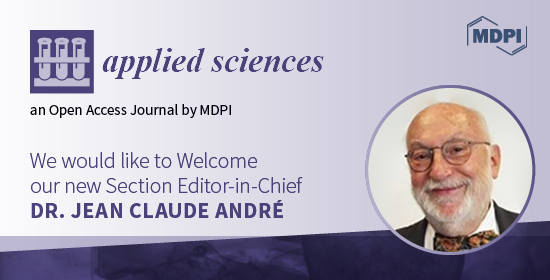
Dr. Jean-Claude André Appointed Section Editor-in-Chief of Section “Additive Manufacturing Technologies” in Applied Sciences
We are pleased to announce that Dr. Jean-Claude André (Emeritus Research Director at CNRS) has been appointed Section Editor-in-Chief of "Additive Manufacturing Technologies" in Applied Sciences (ISSN: 2076-3417, IF: 2.838). Engineer "Processes" of the University of Lorraine, former scientific director of its National Polytechnic Institute, and former Deputy Director of the CNRS, Department of Engineering Sciences (Paris), he holds a Ph.D. in chemical-physics and a French doctorate in physical sciences, supplemented by two postdoctoral stays at the University of Western Ontario (Canada), where he completed his scientific skills on light-matter interactions and the signal processing of optical signals. Upon his return, he set up his team in the field of photo-physical and photochemical engineering. In 1984, with two colleagues, he was at the origin of the first patent on stereolithography, which he developed with his team. The initial lack of interest from the national environment led him to move to the private sector with the scientific responsibility of an R, R&D and consulting and training center of 700 people in charge of occupational risk prevention. This 12-year break reinforced his conviction of the need to engage researchers in interdisciplinary adventures. He returned as a scientific advisor to the CNRS headquarter, and as a "basic researcher", again involved in the 3D field and the development of 4D printing (plus bio-printing).
In addition to these new 3D manufacturing processes, his investment in the 4D field with a short, but efficient, French network of young colleagues attempts to break the epistemological barriers of the field: creativity, heuristics, interdisciplinary approaches, downstream control, inverse problem, proofs of concepts, etc. He is the origin of three start-ups in 3D machining and has about 50 patents (+5 under progress) and enough scientific papers (possibly over 300, ranging from physics, chemical physics, and optical engineering or process engineering to sociology and ethics) to allow for him to increase his investment in time-consuming “slow science”, divergent thinking (before convergence), and epistemology to try to go beyond the “conventional” New Public Management of the (French or European) scientific research system. He has published two books on photochemical engineering, three on additive manufacturing, one on Industry 4.0, three on chemical/process engineering, and two on 4D printing, either alone or with a colleague. Fearing not to do everything, he promised, before a probable end (which may be as far away as possible!). He has begun to write a book on creativity and innovation (now in press) and is beginning to explore biomimetic action paths for soft robotics based on 3D or 4D technologies.
The following is a short Q&A with Dr. Jean Claude André, who shared his vision for the Section with us, as well as his views on the research area and open access publishing:
1. What appealed to you about the journal that made you want to take the role as its Section Editor-in-Chief?I am a tinkerer of science who likes to cultivate himself and to open up to others; this is a big change from the narrow modes of today's too mono-disciplinary management. It is this vision that I wish to share.
2. What is your vision for the “Additive Manufacturing Technologies” Section?
The applied science approach should be more demand-driven and involve more exploration of complexity. This is particularly the case for 3D printing.
3. What does the future of this field of research look like, in your view?
With a technology that is around 40 years old, nothing is stabilized, which maintains a very open field for research, in particular application-oriented.
4. Who should contribute to this Section?
All those who can bring their high-level scientific and/or technological original contributions to the field.
5. What do you think of the development of Open Access in the publishing field?
Traditional journals now also play in this area.
We wish Dr. Jean Claude André every success in his new position, and we look forward to his contributions to the journal.
